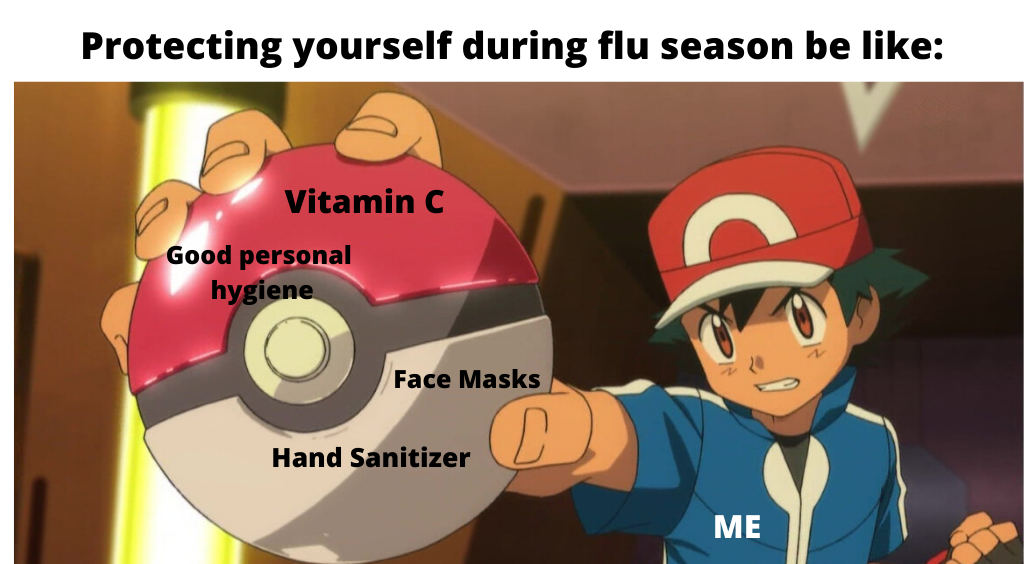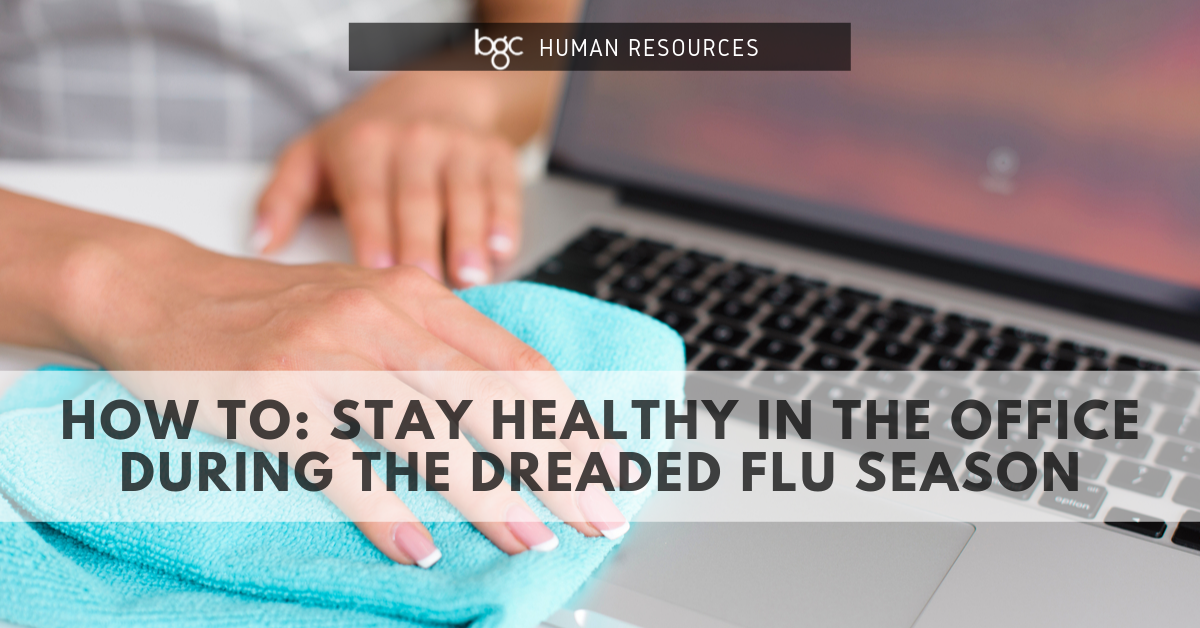[UPDATED 29 JANUARY 2020]: We've included tips for HR professionals to follow and comply with when it comes to dealing with the Coronavirus (Wuhan virus). This information was provided by Raffles Medical Centre's circulars.
The office is a filthy place...literally. Microwaves, door handles, refrigerators, and communal pantries host an abundance of bacteria and viruses. Forget the shared office bathroom! There are more germs in the office breakroom than the bathroom.
It’s the flu season here in Singapore. You’ve probably noticed how easy it is for germs to spread at your workplace. Or the increasing number of colleagues taking the medical leaves throughout the week. We've noticed it within our own job recruitment agency. You might have a big problem on your hands.
Here’s how HR teams in Singapore can combat and navigate the workplace during the dreaded virus exchanging season:
1. Wipe down your desks

The average office desk is a hotbed for pesky microorganisms. Studies reveal that the typical items on your office desk are seven times more contaminated than your average toilet seat. The number increases if you’re someone sharing a desk with another colleague, or if you’re hot desking.
One way to combat the microbes living in your standard office desk is to conduct a daily wipe down. But a standard baby wipe might not be enough. You might be better off with a packet of antibacterial wipes.
Other desk cleanliness pics you might want to take note include:
Wash your hands before and after, when you’re eating food at the desk.
Don’t forget to eat away from the keyboard. You’ll be less likely to collect crumbs.
Try not to chew the pens on your desk.
Give your stationery and desk items a complete wipe-down after lending them to your colleagues.
Affordable cleaning products you might find useful:
Dettol, Anti Bacterial Wipes
Clorox, Disinfecting Wipes
Alcohol Swabs
2. Basic fridge hygiene
.png)
The fridge is home to some of the more dangerous bacteria. Raw food and dubious materials kept in the office fridge are home to bacteria such as E. coli. Listeria, a bacteria responsible for causing miscarriages can also be found in fridges used to keep expired food. The best way to control the level of dangerous microbes in your shared office fridge is basic fridge hygiene.
Some things you might want to practice include:
Place cooked, over the counter food such as sandwiches, salads and wraps on the top part of the fridge.
Keep raw meat and vegetables in different compartments of the fridge, away from cooked and ready-made food items.
Wrap and package cooked food and ready-made food items properly to avoid cross-contamination.
The average fridge contains more than 7,000 bacteria colonies per square centimetres. To combat this, try to wipe down the fridge every two days with a hot washcloth and soapy water. It’ll get rid of more than you can expect.
Do a regular, weekly, toss out. Throw uneaten and expired out at the end of each Friday.
More information on how to clean the office fridge in this article here.
3. Encourage personal workspace hygiene

Your keyboard, mouse, and mugs are hotbeds for mould. Mugs provide mould with the perfect home - they’re moist, and they’re often abandoned and rarely cleaned properly. Keyboards, on the other hand...are nightmare fuel.
If you’re using a desktop, try turning your keyboard over and gently tapping its back. You’ll find bits of old food crumbs, hair, clumped up bits of skin cells scattered all over your desk. Now imagine that you’re sharing your desktop with a colleague, or that you’re hot desking. Terrifying right?
Staphylococcus, a microbe responsible for Staph infections is found in approximately 60% of office desks. And you spend close to half your day resting your hands on these disgusting germ-filled beds.
Good personal workspace hygiene to practice includes:
Wash your work mug every evening with soap and warm water. Don’t just rinse them!
Use your own personal mug instead of one shared by the office.
Throw away used tissues immediately. Don’t leave them on your desks, that’s gross! Flush them down the toilet or throw them in the trash immediately!
Clean out your keyboard regularly. There are videos of them on YouTube.
Keep a bottle of hand sanitizer (Bath and Bodyworks have some nice ones) on your desk! Psst..don't forget to use it.
Please don’t sneeze into your bare hands. Or on your colleagues.
See More: HR Daily Community
4. Wash machines that you use to eat and drink with regularly
.png)
Things like the office water cooler and the microwave are often overlooked and rarely cleaned. Unless an accident occurs of course. NSF International, a public health organization claims that the insides of a water cooler tap contain up to 2.7 million germs per square inch. Which is why it is crucial to regularly clean the insides of the tap.
Follow these steps to properly clean the insides of your water cooler tap:
Screw off the spout tap and rinse.
In a small bowl, combine hot water, lemon juice, and a slice of lemon.
Submerge the spout tap in the lemon water suspension and let sit overnight.
The next day, rinse the spout tap.
It might sound like a lot of effort, but making a roster so that everyone gets a turn to clean the water cooler tap could be one way to lighten the workload. Or invest in a water cooler with a built-in filter.
5. Teach employees the proper way to wash their hands

It’s surprising but not everyone in the office is aware of how to properly wash their hands. Hygienists have found faecal matter on soap dispensers and door handles. In fact, it is estimated that only 5% of people know how to wash their hands properly. And here’s a statistic that’ll make it worse: 1 in 5 people don’t wash their hands.
So how can you combat this problem? It’s simple, teach your employees how to properly wash their hands. And observe them. But it doesn’t have to be as daunting as it sounds. Make it fun! And put reminders up to help instil your employees’ knowledge!
Remember, the hygiene of your office is important. It directly influences the performance, the output, and the morale of the whole company. Additionally, a clean and tidy work environment has an abundance of positive impact on your employees’ mental health.
6. Provide tools to protect, prevent, and defend

- Wash your hands thoroughly (i.e. before and after eating, after handling bodily fluids, after using public transport).
- Use hand sanitizer when hand washing facilities are unavailable
- Cover the nose and mouth area when coughing and sneezing. Remember to sanitize your hands afterwards.
- Get adequate amount of rest and take vitamin C to improve health
- Refrain from indulging in vices that might lower your immune system (i.e. smoking and drinking)
Other preventative measures that HR employees should enforce during a viral outbreak include:
- Provide hand sanitizers and make them readily available to employees
- Provide staff with masks
- Enforce preventative rules amongst staff members with respiratory symptoms
- Discourage presenteeism. Staff members who show up at work feeling unwell or showcasing viral symptoms should be sent home.
- Provide thermometers to ensure daily temperature sceenings can take place
7. Keep employees informed

5 major steps to evacuate employees suspected of the Coronavirus (Wuhan virus):
- Move the staff to a pre-determined isolation area
- Call 995 and describe the staff's symptoms (i.e. fever, respiratory issues)
- Staffers assisting the symptomatic employee should be fully protected. According to Raffles Medical Centre, the best form of protection consists of an N95 mask, body gown, goggles and gloves.
- Isolation room should be sanitised with 1:49 parts of diluted bleach solution, rinsed, and then wiped dry.
- Those with close contact to suspects should be isolated and monitored for the next 14 days.
8. Enforce rules

Think your office or workplace can benefit from these tips? Send this article to your HR team! Or check out our other interesting articles below!
Read More: How I Learnt to Manage My Work-Life Balance After Being Diagnosed with Depression
